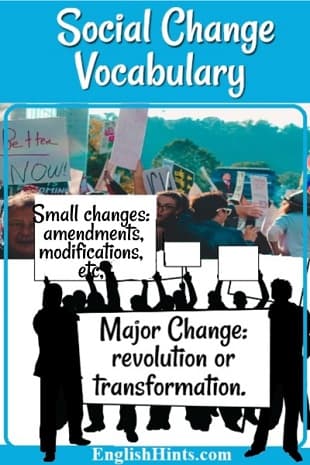Social Change Vocabulary
Social change vocabulary will help you understand or participate in discussions of
- government policy,
- politics,
- business,
- economics,
- history, sociology, and more.
These words describe variations in human societies in different places and periods.
Read about the differences in meaning between several different words for change. Then check out some of their other common forms and some frequently-used phrases (collocations.)
There's also a link to a crossword puzzle to practice some of this (and other) change vocabulary.
There are examples of social change vocabulary in context in The 6 Killer Apps of Prosperity. It's a talk about the institutions, attitudes, and changes that make prosperity possible.
Differences
Between Words Describing Change
To cause change:
- to alter- to make changes in something
- to amend- to make changes (often in a document) to correct problems
- to convert- to change one thing into another
- to modify- to make changes or improvements
- to shift- to move something to the side
- to transform- to change completely
To deal with change:
- to adapt- to change one’s behavior to fit new circumstances
- to adjust- very similar to adapt; to make minor changes in course or actions to fit new circumstances
The process of change:
- cycle- recurring changes, circling around and back again
- to converge- to move closer together
- to diverge- to move farther apart
- evolution- gradual change as time passes
- fluctuation(s)- changes back and forth or up and down, in waves
- revolution- sudden, often violent change
- transition- a gradual change form one condition to another
- trend- a change moving in a particular direction
To change for better or worse:
- to decline- to slowly get worse (it can also mean to refuse)
- to degenerate- to become worse (physically or morally) or lose value over time
- to improve- to get better
- to optimize- to make as good (as near optimum) as possible
- to recover- to return to a better condition after a problem or illness
To get bigger or smaller:
- to contract- to get smaller (pull into a smaller form)
- to decrease- to get smaller in size or numbers
- to diminish- to reduce something (make it smaller)
- to expand- to get bigger (spread out; opposite of contract)
- to increase- to get bigger (opposite of decrease)
- to maximize- to make something as big as possible
- to minimize- to make something as small as possible (or make it seem smaller)
- to reduce- to make something smaller
Other Common Forms of These Words
(to ____ marks a verb; a _____ (or an _____) is a noun; the rest are adjectives):
- adaptable, an adaptation,
- adjustable, an adjustment,
- altered, an alteration,
- an amendment,
- a contraction,
- a conversion (a change into a different form or a different religion), a convert (a person who has been converted),
- a decline,
- a decrease, decreasing,
- diminishing,
- to evolve, evolutionary,
- an expansion, expansive,
- to fluctuate,
- an improvement,
- an increase,
- increasing (as well as the adverb increasingly),
- (a) maximum (n. or adj.),
- minimal, (a) minimum (n. or adj.),
- optimized,
- a recovery,
- a reduction,
- a revolt, to revolt (means to start a revolution. To revolve means to turn in circles, as wheels on a car turn when it moves), revolutionary,
- a shift (this can mean a change OR a rotating change in the workforce in jobs that run 24 hours. We talk about the "day shift", the "evening" shift, and the late night or "graveyard shift") , shifting,
- (transit is a noun meaning transportation, not change), transitional,
- a transformation, transformative
Frequent Word Combinations of Social Change Vocabulary
- diminishing returns (on an investment or proposed program. They often mean it is no longer worthwhile.)
- the business cycle
- an economic adjustment (often used as a way of explaining why something bad happens. For example, layoffs and job losses, to compensate or respond to business losses)
- economic fluctuations, expansion, contraction, or recovery
- minor (or extreme) fluctuations (in the stock market or in prices)
- a transitional government
Traditional institutions or authoritarian governments can evolve into more contemporary or democratic ones. (That means they undergo a gradual transition toward democracy.)
If these governments resist change, pressure may mount until there is a revolution. That would mean a total transformation.
Related Pages
How much of this Political Language do you understand? Learn the vocabulary for argument & compromise.
Understand the way news is reported in English-speaking countries, with links to fairly easy news sites.
You'll need English vocabulary for violence if you want to study history or the news in English. You can learn & practice it here.
Practice social change vocabulary with a crossword. (Answers are here.)
Home> How to Learn Professional Vocabulary> Social Change Vocabulary.
Didn't find what you
needed? Explain what you want in the search box below.
(For example, cognates, past tense practice, or 'get along with.') Click to see the related pages on EnglishHints.
| site search by freefind | advanced |









